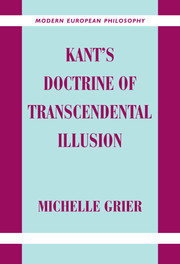Book contents
- Frontmatter
- Contents
- Acknowledgments
- Note on References and Translations
- Introduction
- PART ONE KANT'S DISCOVERY OF METAPHYSICAL ILLUSION
- PART TWO FALLACIES AND ILLUSIONS IN THE CRITIQUE OF PURE REASON
- PART THREE THE DIALECTICAL INFERENCES OF PURE REASON
- PART FOUR ILLUSION AND SYSTEMATICITY
- 8 The Regulative Employment of Reason
- Conclusion
- Selected Bibligraphy
- Index
8 - The Regulative Employment of Reason
Published online by Cambridge University Press: 30 September 2009
- Frontmatter
- Contents
- Acknowledgments
- Note on References and Translations
- Introduction
- PART ONE KANT'S DISCOVERY OF METAPHYSICAL ILLUSION
- PART TWO FALLACIES AND ILLUSIONS IN THE CRITIQUE OF PURE REASON
- PART THREE THE DIALECTICAL INFERENCES OF PURE REASON
- PART FOUR ILLUSION AND SYSTEMATICITY
- 8 The Regulative Employment of Reason
- Conclusion
- Selected Bibligraphy
- Index
Summary
I have suggested from the outset that any interpretation of Kant's “negative” or critical handling of metaphysics in the Dialectic must be balanced by an understanding of the positive account of the illusory principles and ideas of reason. As we have seen, Kant's account of metaphysical error includes a distinction between the unavoidable or inevitable illusions and the fallacies (or the dialectical application of the categories) that are contained in the metaphysical arguments. In the Discipline, Kant refers to the sphere of pure reason as an “entire system” of such “illusions [Blendwerken] and fallacies [Täuschungen] intimately bound together and united under a common principle” (A711/B739–A712/B740). This common principle is, I believe, the illusory P2, the principle that “if the conditioned is given, the absolutely unconditioned is also given.” I have suggested that Kant takes it to ground not only the illusory hypostatization of the ideas but also the transcendental misemployment of the understanding. This reading not only allows us to avoid the charges of inconsistency levied against Kant's “inevitability thesis,” but it also secures a “place” for Kant's upcoming account of the positive function of the ideas and principles (and, indeed the illusion) of reason. In connection with the latter, Kant argues that even though the metaphysical conclusions are dialectical and erroneous, the ideas that motivate them have and retain some indispensably necessary role. In this chapter, I discuss this “positive account.”
- Type
- Chapter
- Information
- Kant's Doctrine of Transcendental Illusion , pp. 263 - 302Publisher: Cambridge University PressPrint publication year: 2001



